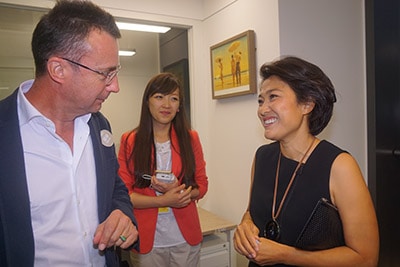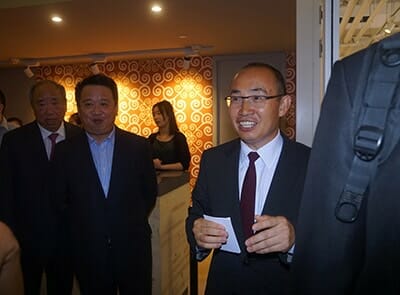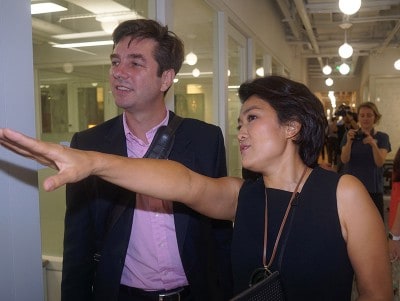
CEO Zhang Xin shows off the SOHO 3Q mobile app to reporters in Shanghai
SOHO China on Monday celebrated its latest move into the online-to-offline world by unveiling its newest SOHO 3Q shared office space in Shanghai.
Zhang Xin, the CEO of SOHO China, led a tour of what has been called China’s “Uber for Offices,” while explaining that the online commercial space program should soon become a major source of revenue for the developer.
In the first half of this year SOHO’s revenues were down by 92 percent compared to the same period of 2014, as the company struggles through a shift from selling office space to small investors to becoming a major commercial landlord leasing space to corporate tenants.
Now SOHO is betting that leasing fitted-out space by the week or month to small and medium-sized businesses will soon replace some of its lost sales revenues.
There’s an App for That
The 3Q facility at Bund SOHO, along the southern part of the city’s historic waterfront area, was built in space that had originally been intended to house retail shops in the newly opened commercial complex.

Zhang led the international media on a tour of the shared office facility
“3Q is a co-sharing office for smaller companies, or companies that have short term needs,” Zhang explained. The shared office format allows customers to lease office space by the week or month through a dedicated website and mobile apps available for both iOS and Android, similar to the model pioneered by US provider WeWork.
Aiming the product at startups, as well as larger corporates looking for flexibility, 3Q provides fitted-out space with shared common areas, printers and copy machines and lounges for companies that don’t want to invest in putting together their own infrastructure. “If you need to rent an office here, we have conference rooms free, wifi free, coffee free – all the services free, and you don’t need to do anything,” Zhang pointed out.
After first rolling out the platform in February of this year, SOHO now has more than 5,000 desk spaces available across six properties in both Beijing and Shanghai, according to Zhang. Within the next two months, SOHO plans to push its number of 3Q desks to 11,000, and according to published accounts, is targetting 40,000 desks for 2016.
SOHO Returns to Small Companies to Rebuild Revenues
For SOHO, 3Q may be an opportunity to rebuild revenues by turning to the small corporates and individuals that helped it become one of Beijing’s biggest landlords.

SOHO Chairman Pan Shiyi presided over an opening ceremony that attracted over 500 guests
After founding SOHO in 1995, Zhang and Pan rapidly built it into one of Beijing’s biggest office developers by taking advantage of the fast cash that could be generated by selling off individual office units to small investors through what is known as a strata-title model.
However, with the office market moving away from haphazardly managed strata-title buildings, in 2012 SOHO turned toward a buy-and-hold model where it would maintain ownership of its properties and lease them out to corporate tenants.
Unfortunately, while being a corporate landlord holds the promise of stable long-term profits, three years later, SOHO has yet to see the fruits of this transition.
After the company revealed its disappointing first-half financial results last month, Moody’s downgraded SOHO’s credit, noting that “…SOHO China’s transition into a build-to-hold business model will take longer-than-expected, thereby increasing the volatility for both its business performance and financial metrics.”
With corporate leasing still not replacing the sales revenues that SOHO lost, the media-friendly company may be hoping that leasing out space to small companies and start-ups may help it to better leverage its flair for publicity to lease out space in its fleet of office properties in Shanghai and Beijing.
Finding a Niche with High Tech Firms
So far, 3Q seems to be giving SOHO much to be thankful for. A quick inspection of the company’s website reveals that across the six centres listed there (three in Shanghai and three in Beijing) there are less than 150 desks available for next month. Zhang pointed out that all of that will change shortly when the new space at Bund SOHO gets listed on the platform.

Zhang showed Rupert Hoogewerf where Hurun Report’s next office might be
3Q’s tenants appear tilted towards technology firms with group-buying site Meituan taking four floors of space constituting 1000 desks, according to Zhang.
The opening event included displays of products and services from 3Q tenants, including drone makers, 3-D printing firms, fashion marketing firms and an online design platform.
Should the initiative prove successful, it could provide a welcome boost for Bund SOHO, a 190,000 square metre project that the developer opened this month. According to figures from property consultancy DTZ-Cushman & Wakefield, Bund SOHO is currently around 35 percent occupied, with asking rentals there averaging RMB 6.6 to RMB 10.6 per square metre per day, well below the rates at prime Puxi properties such as Corporate Avenue which averages RMB 12 per day, or towers in Pudong’s Lujiazui financial district.
- Zhang led the international media on a tour of the shared office facility
- SOHO Zhang Xin is betting that China’s startup companies will be an important source of rental revenue
- Zhang fields questions from the media
- SOHO Chairman Pan Shiyi continues to reassure investors that leasing revenues will improve soon
- Zhang showed Rupert Hoogewerf where Hurun Report’s next office might be
- SOHO China CEO Zhang Xin hopes to show off her 3Q platform in more cities
- One of SOHO’s happy tenants
- The opening ceremony attracted over 500 guests
- Bund SOHO staff greet guests
- Zhang shows off SOHO 3Q’s comfy couches
- Zhang is known for being one of China’s most media-savvy executives
- Bund SOHO












Leave a Reply